#valr
Photo
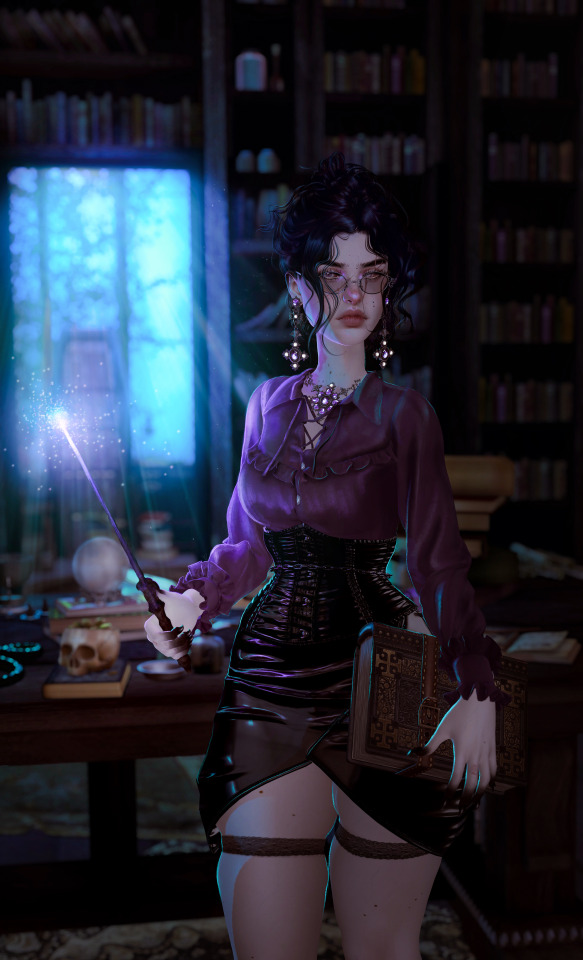
~The Restricted Section~
Outfit:
Top: Insomnia Angel - Francesca Dress - Blouse
Corset: [CX] - Seer Corsets - Black
Skirt: [CX] - Seer Skirt - Black - (The Warehouse Sale - Event - May/June 2022)
Accessories:
Garters: {minuit} - Koalla Garter - Black
Necklace: Random Matter - Verity Necklace - Cool Tones - (Collabor88 - Event - May 2022)
Earrings: Random Matter - Verity Earrings - Cool Tones - (Collabor88 - Event - May 2022)
Wand: Hotdog - Full Wand Collection
Glasses: EarthStones - Eyeglasses - The Countess
Book: [VALR] - Fancy Book Of Fanciness
Body:
Hair: [monso] - Mara Hair - (FaMESHed - Event - May 2022)
Finger Fades: .STOIC. - INKED
Head: Lelutka - Halle
Body: Legacy
#insomnia angel#cx#the warehouse sale#minuit#random matter#tws#hotdog#collabor88#earthstones#valr#monso#stoic#lelutka#sl#second life#fantasy#witch#wand#magic#library#librarian
3 notes
·
View notes
Text
PROMO CODE VA7XAJYM
0 notes
Text
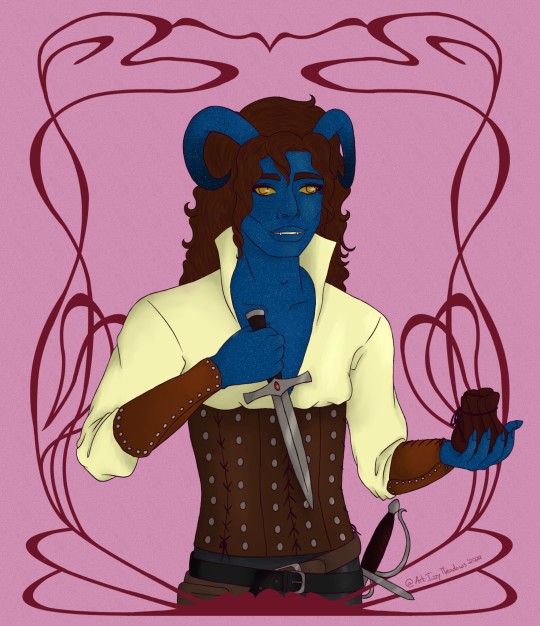
Did this a couple months ago, for this Twitter post, and I decided to add a cute frame.
Frame inspo
[Id: Digital drawing of a tiefling with blue skin full of white-ish freckles, brown wavy hair and yellow eyes. He has a nevus of Ota in the left eye. He has a small bag on his left hand, a dagger on his right hand and a rapier attached to his belt. He wears a cream-colored shirt and dark trousers, with brown armbands and a brown studded leather armor imitating an underbust corset. The background is light pink, with a decorated frame in a darker shade of pink. End id]
#art#dnd#dnd 5e#tiefling#rogue#izzy draws#ocs#sinn valr#d&d#d&d tiefling#d&d rogue#d&d 5th edition#d&d art#dnd art#digital art
16 notes
·
View notes
Text
@etienneulven
location: The Caves
notes: before they get to the keep, they're still traveling through some dank caves; ya feel me.
The scruff on his cheeks told him that it had been about a week since they'd gone underground. Alrik had sworn once that he wouldn't go back into the caves, into the dark that had defined some of his earlier years. The cold here whispered of the chilling madness that you only ever found in the dark, dead whispers of dead men who'd carved their way through these mountains ages ago. Had it always been for this? For the occasion of invasion? The walls were fortified and dimly lit by the stones embedded in the mountains; when rations ran out, the witchers had told everyone that the moss was edible. Cave lichen was only dangerous to those with a weak constitution, which said a great deal to the dysuria some had suffered a few days back.
"Goose, right?" Alrik said, feeling bad for any beast made to wander this cage. Valr spent most of his time in here hooded. The falcon wasn't meant for caverns, but then again, neither were people. "He's a long way from his pack." Then again, so was Etienne.

#int. w/etienne#int. w/etienne.iskaldrik#int. w/etienne.troupe1#tqh troupe 1: refugees#tqh troupe 1#w/etienne.1
10 notes
·
View notes
Text
youtube
Prima di prendere in giro le Valchirie considerate questo:
Il nome Valchiria è formato da due parole: il sostantivo vain o il termine valr (i guerrieri caduti in battaglia) e il verbo kjósa (scegliere). Valchiria dunque è "colei che sceglie i guerrieri caduti in battaglia".
Le Valchirie calano robuste e poppute sul funebre campo di battaglia, verginali crocerossine di Odino, e scelgono i guerrieri caduti, una parte di loro da portare nel Valhalla, direttamente al cospetto del dio, una parte presso il campo di Fólkvangr presieduto dalla dea Freyja, dove opportunamente rimpinzati di idromele diventano Einherjar e si preparano alla grande battaglia finale del Ragnarok, perché una volta guerrieri non si può più sfuggire al destino di guerra, nemmeno dopo la morte.
Io amo tutte le favole dove sono le donne alla fine a salvarci: salvateci, o dee misericordiose.
18 notes
·
View notes
Text
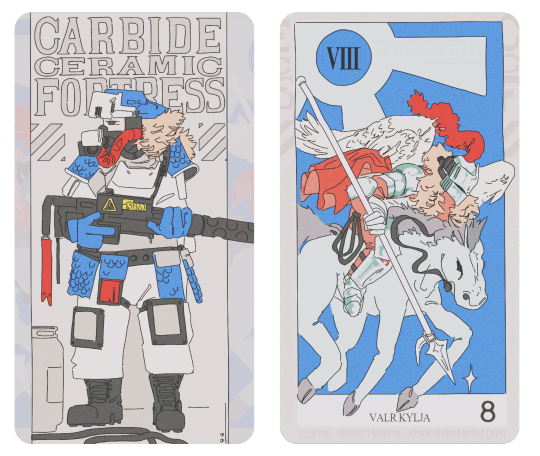
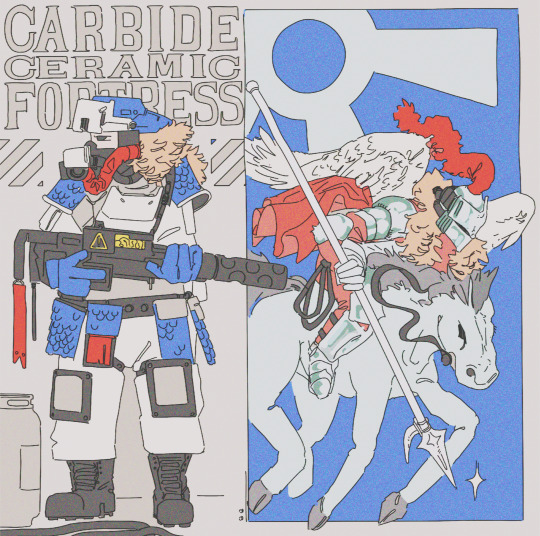
Valkyrie, Valr kylja, Arbiter of the Slain,
Ardor of Primordial Light
site security officer, authority on anti-terrorist efforts,
Field Operative Carbide Ceramic Fortress
Singular Photoevaporative Point at infinity bisected twice
Decaying Helical Firmament and Explosive Radiating Growth
Don't look up, there's nothing there
#scifi#manga art#sci fi manga#industrial#retro anime#anime art#manga#tarot#tarot cards#tarot deck#divination#tarotcommunity#astrology#cosmology
31 notes
·
View notes
Text
Indo-European structure of the Baltic pantheon hinges heavily on a correct appreciation and interpretation of Patollus-Pecullus. Christian demonology found him exploitable yet did not quite know what to do with him. He was a demon of the underworld and leader of the host of the dead in the skies, hellish and aerial at the same time. This hesitation helps piece together his original nature. He has a Lithuanian allonym Velinas (Velnias, Vels, nowadays 'devil'), which is cognate with veles 'ghosts' and with the ancestral goddess Veliuona; Szyrwid's dictionary of 1629 already equates Velnias with 'Piktis'. In Lithuanian folklore Velinas is the one-eyed, prophetic, treacherous, raging god of the veles who fight, hunt, and march in the skies; he is also the lord of hanging and the hanged. This dossier is ample to permit a typological comparison with both the one-eyed Hangagud Odin and the Old German Wutanes her. Beneath the death-god described by Simon Grunau and revived by Gunter Grass and the devil of demonology and folklore, we find a principal figure of the Baltic pantheon, whose name Pecullus has the same "rage" meaning that inheres in Odin, and whose parallel name Velinas is best connected with Old Norse valr, denoting the host of the slain. The presence of such a magical, death-oriented high god in close complementarity with the ruling thunder-god seems to be typical of several contiguous nothern European subgroups (cf: Odin : Thor and perhaps Esus : Taranis); Patollo's white headcloth may indeed be the missing link connecting Odin's floppy hat with Rudra's turban in India.
Comparative Mythology. Jaan Puhvel.
14 notes
·
View notes
Note
Now that your stance on Valhalla is pretty established, I wonder what is your stance on Fólkvangr? (narratively the same as Valhalla but this time ruled by a less-realpoliticking goddess; with the bonus of being opened to certain women). Is it the same?
I don't think the scant information we have about Fólkvangr is really enough to use it to make claims as big as the ones I do about Valhöll. I mean, since Grímnismál is one of the main ways that we have to know things about Valhöll, yeah, some of what I said about that will naturally apply to Fólkvangr as well, but not all of it. I also want to point out that I don't necessarily have a problem with all the speculation about Fólkvangr that modern heathens do, I'm just not going to participate in pretending it isn't speculation.
Here's every single word that Norse mythology has about Fólkvangr, from Grímnismál (and repeated by Snorri, who through the mouth of Hárr adds only that it's a bær 'town' or 'farmstead' in heaven and that the hall itself is called Sessrúmnir):
Fólkvangr [er inn níundi/heitir],
en þar Freyja ræðr
sessa kostum í sal;
halfan val
hon kýss hverjan dag,
en halfan Óðinn á.
Fólkvangr [is the ninth/it is called],
and there Freyja chooses
who sits where in the hall;
half the battle-slain
she chooses every day
but Óðinn has half.
Not only that but it's contained within Grímnismál, a poem not widely recognized as the batshit (affectionate) poem it is, the thing is pure lore concentrate. When you consider the prose intro and outro are probably added much later, it has almost no actual internal story and it's entire purpose is probably to encode the hugest amount of mytho-/cosmological information possible into a format easy to memorize. What one thinks about Fólkvangr will be at least partially determined by what one thinks about Grímnismál, who it was composed and/or performed by, who its intended audience was, if it's a complete cohesive poem or a mish-mash of different things, etc. If you're interested in digging more into that there's a good article by Bo Ralph on it where he also discusses earlier research. The poem presents itself as highly-restricted knowledge; I have no suggestions regarding whether or not we should believe it.
Since there is exactly one word telling us who goes to Fólkvangr (valr 'battle-slain') I don't infer any different distribution of gender than in Valhöll. The assumption that Freyja is more likely to choose women who die in battle than Óðinn is is, in fact, an assumption. It also doesn't say that Freyja gets first pick like everyone thinks. You could make the argument based on this stanza in isolation that Freyja "chooses" (kýss) while Óðinn gets the leftovers, but in stanza 8 it's Hroptr who kýss. The idea of Óðinn building some human protégé up for years and then turning the tide of battle against him in order to claim him and then Freyja going "mine" is very funny to me but we never see it happen.
I don´t think that Þorgerðr Egilsdóttir's line about how she wasn´t going to eat until she did so with Freyja is evidence she expected to go to Fólkvangr. All that tells us is that 13th century Christians thought 10th century pagans expected to see their gods when they died (I am not phrasing it this way to imply they were wrong, nor is this disclaimer to imply they were right).
The whole thing generates more questions than answers and that's really what its value is. The question of why it isn´t mentioned anywhere else may be less salient when you consider how little lore there is about Freyja in general, but still isn't trivial.
(Wild speculation to follow).
My shot in the dark is that there was a trajectory in late pre-Christian paganism of responding to concerns brought on by contact with Christianity, namely increasingly complex view of afterlife and a more generally skyward and universalist (in the real sense of the term) orientation. This might not take much actual invention, just a little switch of emphasis, because if my guess is right there may not have been a cosmic complex of afterlife abodes, but highly complex otherworld geographies probably did already exist without them necessarily being thought of as afterlife locations. For some reason, as often as Fólkvangr is mentioned by modern heathens as an alternative to Valhöll, everyone seems to miss that there is even better evidence for an afterlife place governed by Þórr, mentioned in passing (easily dismissed as a joke, even) in Hymiskviða but then likely actually described here in Grímnismál.
There may be something of an ecumenical impulse; we expect that the poets who contributed to the creation and spread of Grímnismál were probably devoted to Óðinn as he is both the narrator/protagonist and the god the poem has the most information about (oh yeah and also the specifically saying flat-out "Óðinn is the highest god" in stanza 44), but there seems to be an attempt at some kind of totality, even if it falls short. It features Ullr and Forseti -- two gods we know (or at least strongly suspect) to have been extremely important but in a contextually limited way that normally doesn't extend into the main body of myth that we still have access to.
We might be looking at a poem meant to prepare skálds to be able to operate with a variety of audiences but also in a de-facto way it codifies a sort of pantheon that we (finally, and mostly rightfully) have gotten used to denying was a real recognized thing, and also pushes toward a codified and universalist paganism, even if only as a utility for skálds. And to be clear, I don't rule out the possibility of it being intentional, an attempt to demo a universalist paganism that could go toe-to-toe with Christianity. I'm just saying that it doesn't necessitate that; an oral poet who grows up in one area but needs to be able to operate in others with distinct customs would benefit from a sort of "higher" stratum of myth that is more all-encompassing than that found in any specific place.
But some of these ideas, including Fólkvangr and Bilskírnir, may have only ever been half-finished and either remained so regionally-specific that they never spread enough to be seen in the sagas, or were created in the supra-regional context I'm proposing and never actually took hold in a local community, either because the conversion to Christianity happened before it had a chance to spread; or because this general trajectory wasn't actually popular to begin with.
There are more questions to ask (e.g. why is Freyja creating a reserve of warriors if she's never mentioned in connection to Ragnarök?) but I've probably gone on long enough to get the point across that considering Fólkvangr in any way a settled, secure, well-understood idea is cheating ourselves.
40 notes
·
View notes
Text
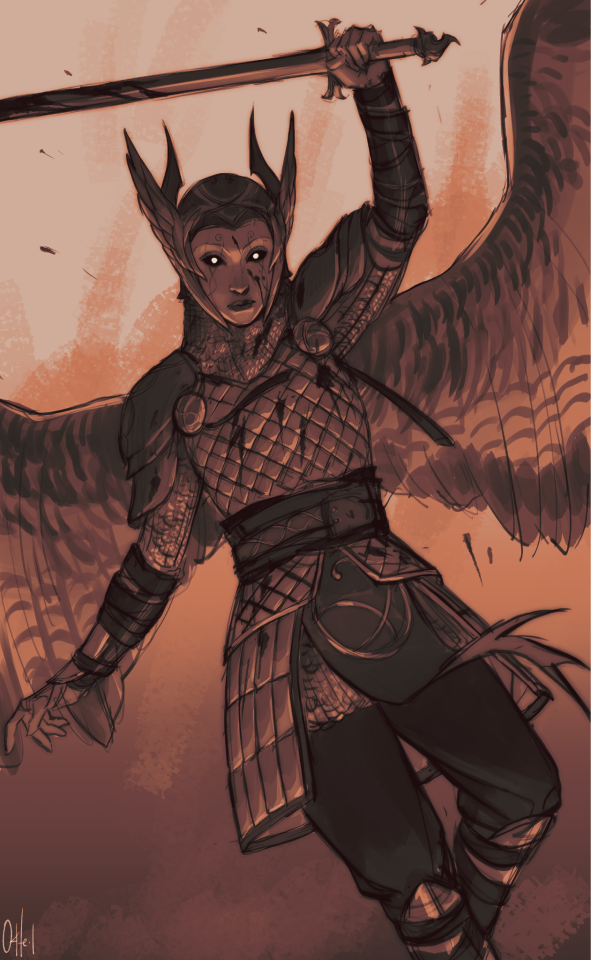
meet my new oc, Valr 🪶
6 notes
·
View notes
Text
Vlapno
The Mindutme word hwas [hwɐs] means flower; its plural is hwasr [ˈhwɐ.sr̩]. With the exception of nouns in classes 1-3 (which refer to humans), Mindutme marks possession on the noun that is possessed, rather than the possessor. Most nouns in classes 4-7 therefore have four forms. For hwas, the possessed singular form is hwast [hwɐst] and the possessed plural form is husárt [hu.ˈsɐɾt].

Hwas is also the name of the letter used to write the sound /h/, which was originally a depiction of a flower:

One family of flowers found in many places throughout the world where Mindutme is spoken is similar to orchids. The word val [vɐɫ] refers to either the family as a whole or a specific subgroup of the family whose seed pods are used to make a spice—basically, Fantasy Vanilla. The plural is valr [ˈvɐ.ɫr̩], the possessed form is valt [vɐɫt], and the plural possessed form is vlart [vɫɐɾt].

Mindutme also has the word pano [ˈpɐ.no], referring to alcohol or any alcoholic drink. Its other forms (in the same order as above) are panor [ˈpɐ.noɾ], panot [ˈpɐ.not], and pnurt [pnuɾt]. The plural forms are only used in reference to servings of drinks (which is good, because I certainly wouldn’t want to have to say ‘pnurt’ very often and keep a straight face).

Finally, there is a compound word formed from these two roots: vlapno [ˈvɫɐp.no], (vlpanor [vɫ̩.ˈpɐ.noɾ], vlpanot [vɫ̩.ˈpɐ.not], vlpnurt [vɫ̩.ˈpnuɾt]). Though it primarily refers to a popular vanilla-flavored alcoholic drink, it can also refer to vanilla extract.

You have @jakecito98 to thank (or blame) for this post.
16 notes
·
View notes
Text
Headcanon time!
To understand ones song is to become of it, to become one with it in essence in perfect understanding.
The Valar’s song is the light of idea, Melkor’s unthinkable knowing, it returns all the actualized song of the world back into the abyss of uncreated harmony
Melkor is like Vaatu and the Valar like Raava. They are both reflections of one underlying hymn: Erus song, which represents the wholeness and totality of all creation. The Valar can only comprehend their part of his song, and cannot understand Melkor, their opposite counterpart, at all. But they, chaos and order, destruction and peace, are both needed to complete Erus theme. They manifest different powers of the world, and are forces of nature, neither more wrong than the other, just unable to understand the others song at all. Melkor is raw destructive energy, and annihilates all he touches- but he, woefully, returns through destruction everything back to pure song, unadulterated by name or actuality. He cleans up the mess of the cosmos, and purifies it with a ravenous, insatiable hunger and then love so concentrated it dissolves all boundary and self existence. But none of the Valar can comprehend him, his side of the hymn, especially the fact that he dose it all out of an overwhelming love for creation, because the Valr only know how to create, and he only knows how to destroy and render all things undone. He is the end of all things, and none can escape his grasp. He dissolves name and place , identity and actuality. His song is ever ravenous, never ceasing in its desire, always hungry, cleansing and devouring the whole world. But no one gives themselves to him willingly- except Mairon, who despite being a neat freak, willingly seeks to be consumed by Melkor. He alone can comprehend the entirety of Melkor’s aria, and Melkor vice verse. They twine their songs and embody each other. They understand each other so deeply that Eventually there is no differentiation between them, and their songs have become one-
#melkor#silmarillion#tolkien meta#headcanons#angbang#sauron#mairon#tolkien#the silmarillion#morgoth#melkor x mairon
34 notes
·
View notes
Text
I have played D&D four days in a row and managed to do stuff in all the games!
-On Saturday Arendal, my fighter gnome, acted as a confident for the npc we have to help and identified a ceremonial dagger. (This was the least cool tbh)
-On Sunday Valr, my rogue tiefling, found a note we used to understand what we needed to do next, and dealt some good damage to the bad guy's monster minion. Also I got to say "I don't really care about the people at the village, but I want to live" which is Valr's essence and my peak acting with him.
-Yesterday Darshan, my barbarian leonin, destroyed two skeletons in one turn and used a ballista in the next one to restrain the big boss enemy with an arrow head, giving my friends advantage in all their attacks during all that round (and then we won).
-And today Nocje, my sorcerer drow, casted polymorph on an undead gibbering mouther to turn it into a rabbit, granting the bard an opportunity to dispel the magic that kept the monster "alive".
I love D&D.
#d&d#dnd#dungeons and dragons#things like these make me feel that i'm actually learning to play this properly#the darshan and nocje ones are the most epic#but the others were more focused on roleplaying and less on stats and abilities#in fact the saturday session didn't have combat#but it was really interesting#and arendal is the character i have played the least out of these four so he's the most difficult for now#but valr is complicated because he's really closed off and wary#so it's hard to balance that with interacting with the others#darshan and nocje are way easier in that sense because they're nice#but i was scared about nocje at first because i had been told sorcerers are one of the two hardest classes to play#and sometimes i really don't know what to do with her but it's not as hard as i feared#but yeah#balancing the roleplaying part with the skills and stats part is kinda hard to me#i'm way better at the skills and stats one#but i do feel like i'm learning to roleplay better thanks to these characters#i love all of them a lot
1 note
·
View note
Text
@prcspero
location: Hrimthur's Wasteland
notes: After the events of The Last Night
Asylum. Plague. Death. The wheel did not care if a person was young, or afraid. It certainly did not care what they wanted. The wheel had called them to this, whether they could bear it or not. Alrik had cracked the night his life had gone up in flames, broken down in the mines - what could be left now but shards? Pointed, sharp, and prepared to cut down anything that stood between himself and his sister.
The sun burned at the edge of the horizon and cast shadows over the cold wasteland through the sparse, dead trees that protruded through the ice. In the far distance, Alrik had caught sight of a few hints of game; cunning arctic foxes that might as well have been tricks of the light. Overhead Valr returned with nothing but rodents snatched from their shallow burrows, or in the brief stretch of time they spent skittering up a tree. Perhaps his bird would die from the blight next, it seemed capable of claiming enough.
Alessia did not die. Alrik would have known. He'd have felt it if his sister had passed. Since dawn had broken over the last night at Nornwatch Keep, he'd held onto this. Stubborn as the bedrock below the snow they treaded across; the Iskaran would not accept anything until he saw it with his own eyes.
Taken, they had said, but for why, none of the Legion would say. They marched towards an outpost and prepared to make camp where they could. In makeshift tents before the midnight sun could dip below the horizon and bathe the cold world in an even colder dark.
Alrik, dotted with the ashes of those that had been burned, marched beside Prospero alongside the Iskaran survivors. More lived than had been killed, but there were fewer now; which meant fewer mouths to feed.
"Do you know the story of the dvergar?" Alrik looked off towards nothing but the horizon and the fading light as he spoke. Face marred black in places by the ashes of his kinmen, he didn't wait for Prospero's response before he spoke.
"Before our world was broken, it is said that dwarves once ran the mines beneath Iskaldrik, that our nation was their home, and our great city the jewel of their creation. King Hrimthur's people toiled and worked alongside the jotunn, crafting armaments and machinery that would put any Lysaran vessel to shame." Distinct, Iskaran notation curved around the syllables with curt, sharp remarks as he remembered the way his father once cast shadows on the wall from the forge as he retold the tale. "My father told me that the dvergar dug too deep and found evil in the place of gold. I laughed," Alrik looked to the druid next to him, "then I asked him ' but then why we keep digging?"
"Because, Alrik, he said." Blue eyes looked back towards the horizon as he tried to remember where his sister had been during the story. Had she been there? It was so long ago now. "men never know when to quit. So I asked him, 'what happened to the dvergr, faðir?' Then he told me, why little drengr, we're standing on them." Alrik laughed because he remembered how his father had spooked him, tickled him, and laughed. The story was not funny though, hardly then, and not now. Unlike then, his laughter was flightless now, bitter as nightshade.

#w/prospero.2#int.w/prospero.iskaldrik#int.w/prospero.hrimthur#int.w/prospero.troupe1#tqh troupe 1#tqh troupe 1: the last night
5 notes
·
View notes
Text
So, the word Valkyrie can be reconstructed in proto-Germanic as *wala-kuz-jō, lit. "corpse(battle-slain)-choice-AGENTIVE" (the meaning "Chooser of the Slain" should be familiar). The noun "kuza" is even vaguely to do with the English "choice."
The proto-Germanic *walaz, meaning something like "those killed in battle/the place they are killed" is the origin of the Old Norse "valr," which has basically the same meaning. This is the origin of Valhöll and Valravn and similar words which the average norsedork will know.
There is, in proto-Germanic, another noun meaning "choice", and it is related to the English "will" and the German "Wahl": *wala. This word shows up in Old Norse as "val," and iirc the word "valg" has become the more common word by far in Dansk and Norsk than the cognate of "choose", which I suppose would be "kår."
All this to say that there is an alternate universe in which, instead of "Valkyrja," the Vikings said "Valvalja," from the proto-Germanic *walawala (or *walawaljō I suppose), giving Modern English "Valval."
4 notes
·
View notes
Photo
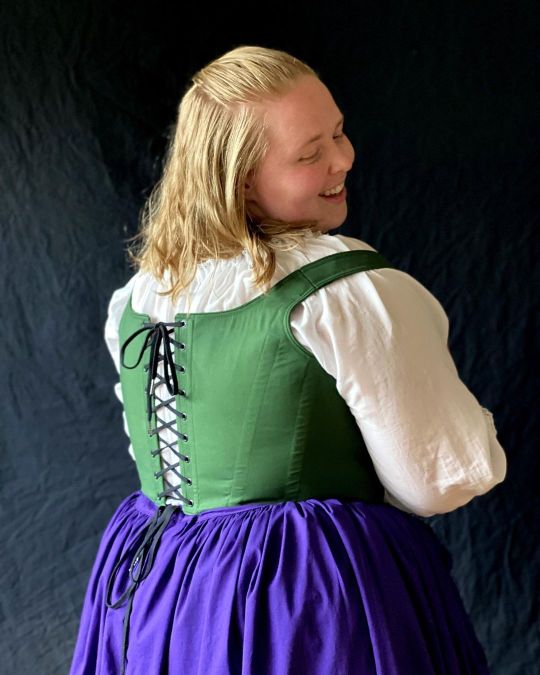
Ren Faire is coming! Are you ready? #periodcorsetsfestivalwear #renfairecostume #renfairecostumes #corsetlacing #customcorset #customcorsetry #renfaire #renaissancefaire #renaissancecostume #renaissancefestival #festivalwear #festivalcorset (at Seattle, Washington) https://www.instagram.com/p/CfpL5v-vALr/?igshid=NGJjMDIxMWI=
#periodcorsetsfestivalwear#renfairecostume#renfairecostumes#corsetlacing#customcorset#customcorsetry#renfaire#renaissancefaire#renaissancecostume#renaissancefestival#festivalwear#festivalcorset
3 notes
·
View notes
Text
As it turns out, Valhalla (hall of the slain, from valr and hel) has etymologically nothing to do with valor (from Latin)
1 note
·
View note